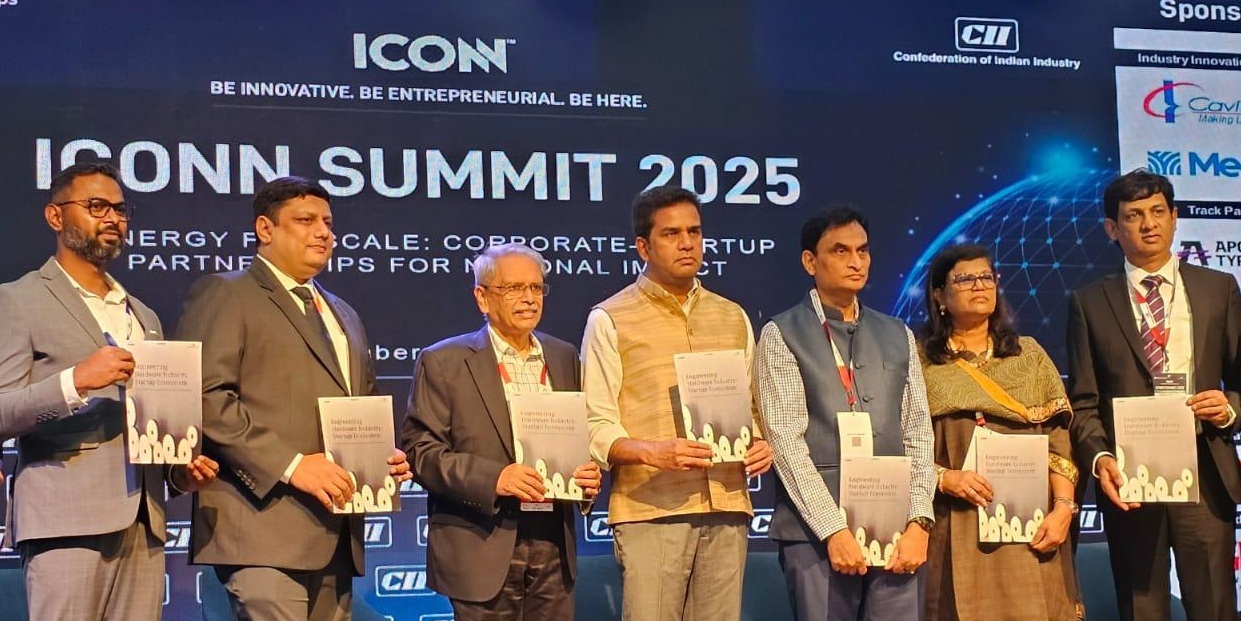The Confederation of Indian Industry (CII), in collaboration with KPMG and Synopsys Inc., today unveiled India's first comprehensive Engineering Hardware Industry Startup Ecosystem Report at the ICONN Summit 2025 in Hyderabad. The report captures insights from more than 100 engineering and hardware startups across cleantech, defence, electronics and advanced manufacturing, offering a clear picture of India's evolving hardware innovation landscape and its role in powering India's Viksit Bharat vision for 2047.
The report highlights that India's engineering hardware industry is on a strong growth trajectory, projected to reach 296 billion dollars by 2034. It combines market analysis, investment trends and sectoral projections with on-ground feedback from founders to present an actionable roadmap for startups, investors and policymakers. The goal is to fast-track innovation, strengthen competitiveness and accelerate India's transition toward a high-technology, manufacturing-driven economy.
Speaking at the launch, Mr C K Ranganathan, Co-Chairman, CII National Startup Council, said, "CII is proud to present this pivotal whitepaper, developed in collaboration with KPMG and Synopsys, which explores the immense potential of India's engineering hardware startup ecosystem. As India advances toward the vision of Viksit Bharat@2047, deep-tech and hardware innovation will serve as vital drivers in achieving global leadership in manufacturing and technology. Drawing from extensive insights and research, this publication outlines a strategic roadmap to unlock growth, foster innovation and strengthen competitiveness across the hardware ecosystem. Together with our partners, CII remains committed to transforming these insights into impactful action, positioning India's engineering hardware startups as a cornerstone of the Viksit Bharat vision."
Startups surveyed in the report point to three major challenges shaping their journey. More than half cite gaps in digital tools and affordable design technologies, which slow down prototyping and increase development costs. Limited access to specialised infrastructure remains another barrier, with many startups calling for advanced testing facilities, prototyping centres and fabrication labs. Talent availability also continues to be a concern, with 67 percent highlighting the need for trained engineers who can work on real-world hardware problems.
Murali Pullela, Area Sales Director, Synopsys Inc., said, "As a global leader in engineering solutions from silicon to systems, we believe in the transformative power of technology to redefine industries and accelerate innovation. This report captures the immense potential of India's engineering hardware startup ecosystem. Startups have cited barriers like access to digital tools and affordable design technologies as major constraints, and that begins with access to advanced simulation and design tools. Strategic interventions are the need of the hour to unlock the sector's full potential, and we at Synopsys are committed to empowering innovators with advanced simulation capabilities that help turn bold ideas into breakthrough innovations."
The report lays out clear recommendations for all stakeholders. For startups, it emphasises the need to build value-added partnerships, invest in digital capabilities and prioritise sustainable product design. Policymakers are encouraged to strengthen academia-industry collaboration, enhance regulatory support and create strong IP frameworks. Investors and institutions are urged to adopt outcome-oriented funding models and provide patient capital to support long-gestation hardware ventures.
With contributions from industry leaders, entrepreneurs and academia, the report positions India's hardware sector as a crucial enabler of the country's technology-driven growth. It reflects a maturing ecosystem ready to scale, collaborate and innovate, placing hardware innovation firmly at the centre of India's long-term development story.



























